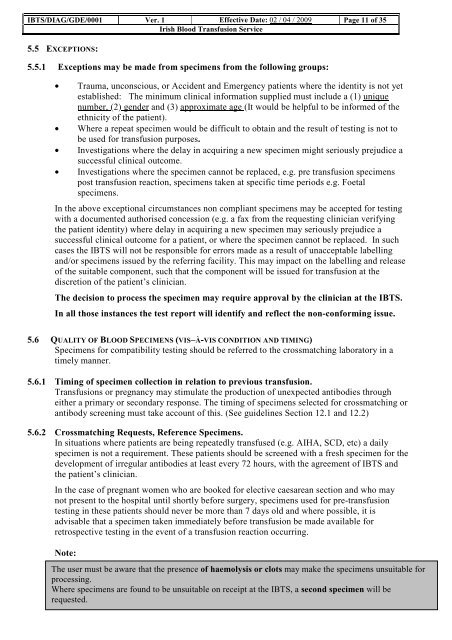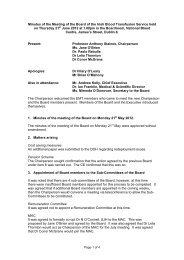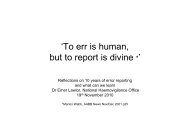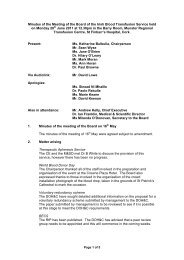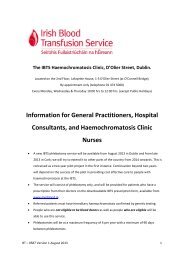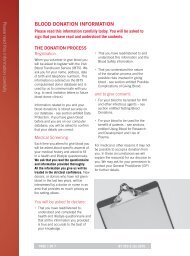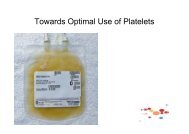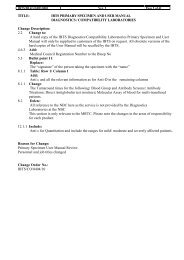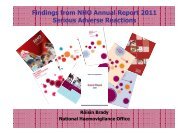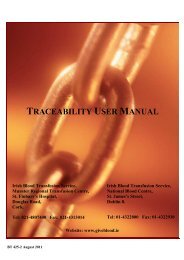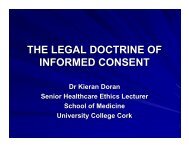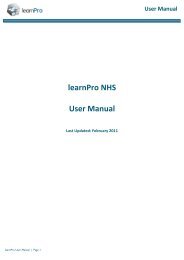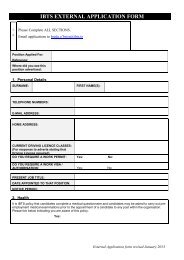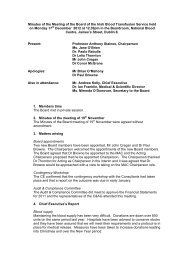Primary Specimen & User Manual - Irish Blood Transfusion Service
Primary Specimen & User Manual - Irish Blood Transfusion Service
Primary Specimen & User Manual - Irish Blood Transfusion Service
You also want an ePaper? Increase the reach of your titles
YUMPU automatically turns print PDFs into web optimized ePapers that Google loves.
IBTS/DIAG/GDE/0001 Ver. 1 Effective Date: 02 / 04 / 2009 Page 11 of 35<strong>Irish</strong> <strong>Blood</strong> <strong>Transfusion</strong> <strong>Service</strong>5.5 EXCEPTIONS:5.5.1 Exceptions may be made from specimens from the following groups:• Trauma, unconscious, or Accident and Emergency patients where the identity is not yetestablished: The minimum clinical information supplied must include a (1) uniquenumber, (2) gender and (3) approximate age (It would be helpful to be informed of theethnicity of the patient).• Where a repeat specimen would be difficult to obtain and the result of testing is not tobe used for transfusion purposes.• Investigations where the delay in acquiring a new specimen might seriously prejudice asuccessful clinical outcome.• Investigations where the specimen cannot be replaced, e.g. pre transfusion specimenspost transfusion reaction, specimens taken at specific time periods e.g. Foetalspecimens.In the above exceptional circumstances non compliant specimens may be accepted for testingwith a documented authorised concession (e.g. a fax from the requesting clinician verifyingthe patient identity) where delay in acquiring a new specimen may seriously prejudice asuccessful clinical outcome for a patient, or where the specimen cannot be replaced. In suchcases the IBTS will not be responsible for errors made as a result of unacceptable labellingand/or specimens issued by the referring facility. This may impact on the labelling and releaseof the suitable component, such that the component will be issued for transfusion at thediscretion of the patient’s clinician.The decision to process the specimen may require approval by the clinician at the IBTS.In all those instances the test report will identify and reflect the non-conforming issue.5.6 QUALITY OF BLOOD SPECIMENS (VIS–À-VIS CONDITION AND TIMING)<strong>Specimen</strong>s for compatibility testing should be referred to the crossmatching laboratory in atimely manner.5.6.1 Timing of specimen collection in relation to previous transfusion.<strong>Transfusion</strong>s or pregnancy may stimulate the production of unexpected antibodies througheither a primary or secondary response. The timing of specimens selected for crossmatching orantibody screening must take account of this. (See guidelines Section 12.1 and 12.2)5.6.2 Crossmatching Requests, Reference <strong>Specimen</strong>s.In situations where patients are being repeatedly transfused (e.g. AIHA, SCD, etc) a dailyspecimen is not a requirement. These patients should be screened with a fresh specimen for thedevelopment of irregular antibodies at least every 72 hours, with the agreement of IBTS andthe patient’s clinician.In the case of pregnant women who are booked for elective caesarean section and who maynot present to the hospital until shortly before surgery, specimens used for pre-transfusiontesting in these patients should never be more than 7 days old and where possible, it isadvisable that a specimen taken immediately before transfusion be made available forretrospective testing in the event of a transfusion reaction occurring.Note:The user must be aware that the presence of haemolysis or clots may make the specimens unsuitable forprocessing.Where specimens are found to be unsuitable on receipt at the IBTS, a second specimen will berequested.


